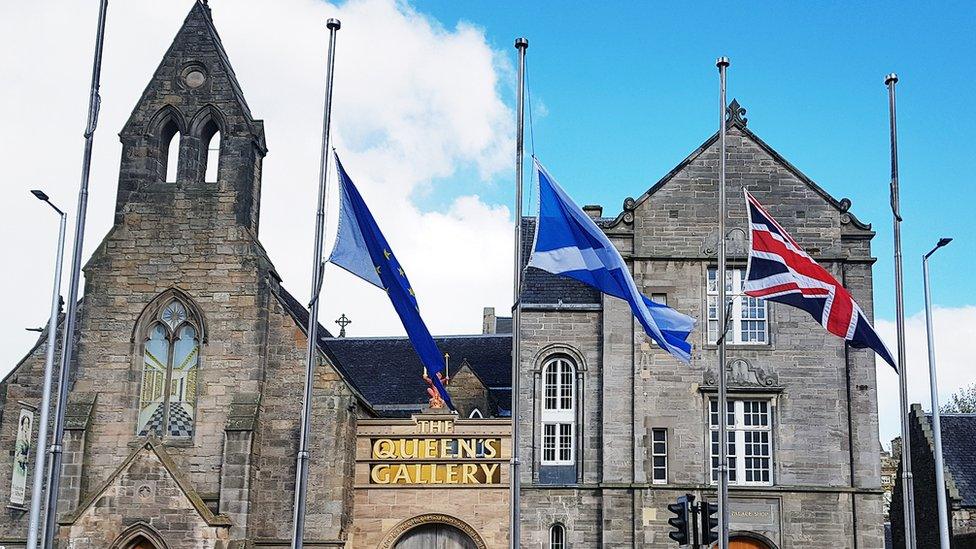Scottish election 2021: Will the suspension of campaigning affect the Holyrood vote?
- Published
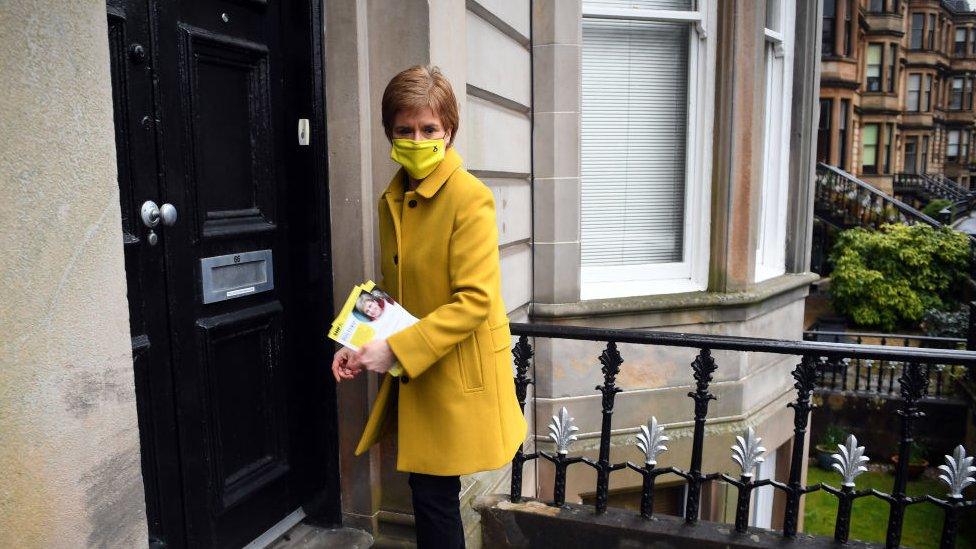
Politicians will be allowed to do more than just deliver leaflets when campaigning resumes
Campaigning for the Scottish Parliament election is resuming after parties put their efforts on hold due to the death of Prince Philip. What impact - if any - will the suspension of campaigning have on the election, and how might things change going forward?

What's happening?
The Holyrood campaign was just over two weeks old when parties put their activities on hold on Friday.
Some MSPs actually found themselves prematurely back at parliament after it was recalled to pay tribute to the Duke of Edinburgh - the first time this has ever been possible mid-campaign, with Holyrood having gone into recess rather than dissolution this year due to the uncertainty of the Covid-19 pandemic.

SCOTLAND ALERTS: Get extra updates on BBC election coverage

Candidates are likely to take a break again on Saturday, 17 April, as Prince Philip is laid to rest - but are otherwise now back in action.
Labour's manifesto launch was pushed back a week, but other party policy papers are due to appear on schedule over the coming days - and the second TV debate of the season is due to take place as planned on Tuesday evening.
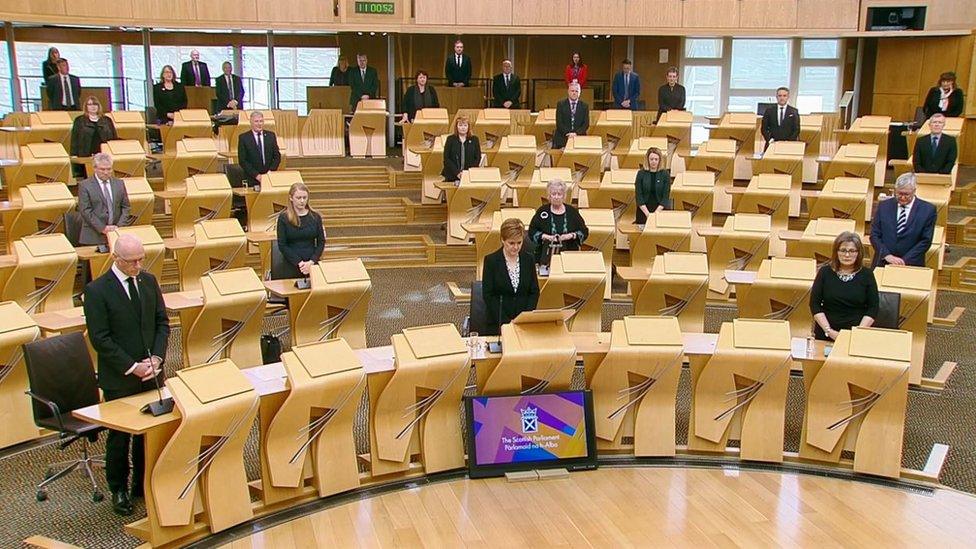
MSPs observed a minute's silence before paying tribute to Prince Philip
Has this happened before?
The 1997 devolution referendum campaign was put on hold for a week after the death of Princess Diana, only resuming five days before polling.
The result was never hugely in doubt, with a resounding win for "yes" as the answer to both questions on the ballot paper - that a Scottish Parliament should be set up, and that it should have tax-raising powers.
However, there has been some speculation that the "no" campaign could have built momentum on the second question, over tax powers, in the final weeks of the campaign - had it not been "reset" by the week of national mourning.
The 2016 EU referendum campaign was also suspended following the murder of MP Jo Cox, again in the week before polling day. Whether this had an impact on public opinion has been a controversial question, but it does not appear to have had any significant bearing on the overall result.
The duke's death may not make a material impression on the points being put across by parties, but will the enforced break change anything?
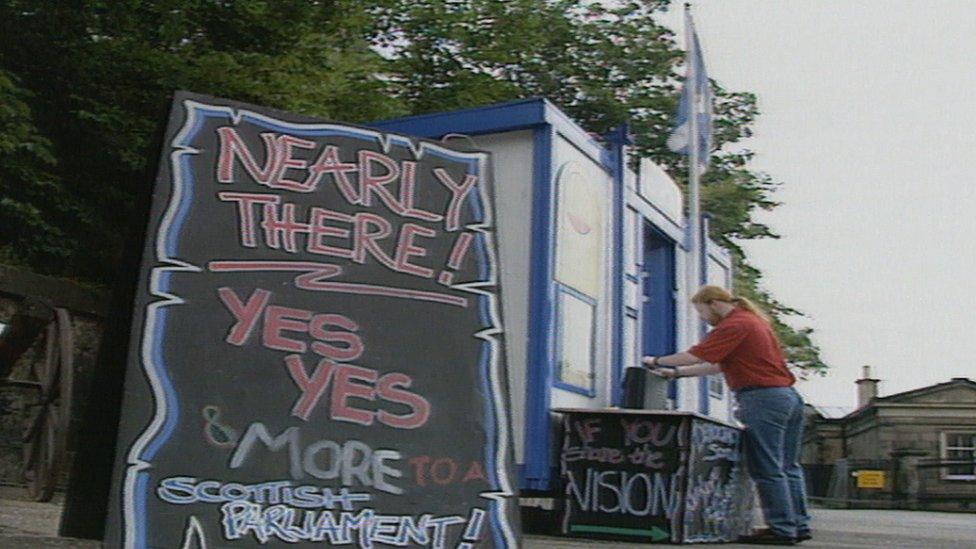
There was a long-running campaign for a Scottish Parliament - but official efforts were put on hold in the final days before the vote
How could the Holyrood race be affected?
The key difference between those past campaigns and the current one is that the Holyrood race is nowhere near as close to polling day; in many ways, the election is still in its infancy.
Recent polling would suggest that the early exchanges have not made a vast difference to how people are planning to vote, with the average position of each party in the standings pretty much where they have been all year and indeed since 2016.
The campaign is likely to change significantly in the weeks ahead - but it was probably due to anyway.
To start with, the suspension came before any of the five major parties had launched a manifesto. The debate was still running along well-trodden lines, with familiar arguments and promises being rehearsed.
Things are due to get far more specific and policy-oriented in the days ahead, as parties set out their platforms - and pick apart those of their rivals.

SCOTLAND'S ELECTION: THE BASICS
What elections are happening? On 6 May, people across Scotland will vote to elect 129 Members of the Scottish Parliament (MSPs). The party that wins the most seats will form the Scottish government. Find out more here.
What powers does the Scottish Parliament have? MSPs pass laws on most aspects of day-to-day life in Scotland, such as health, education and transport. They also have control over some taxes and welfare benefits. Defence, foreign policy and immigration are decided by the UK Parliament.
How do I vote? Anyone who lives in Scotland and is registered to vote is eligible, so long as they are aged 16 or over on the day of the election. You can register to vote online, external.

Could Covid-19 restrictions play a part?
The other way in which campaigning is due to change is thanks to Covid-19 restrictions beginning to ease.
Without being too unkind to politicians, it's possible that the bulk of the populace hadn't really noticed there was an election going on, in any serious way.
Beyond the lack of fresh life-changing manifesto pledges, most traditional campaigning activities have been off-limits - with candidates essentially just taking the burden off the postal service by delivering their leaflets themselves.
Yes, there have been daily photo-ops by leaders, but their chances to put their messages across directly to the public have largely been confined to TV clips, social media adverts and live-streamed speeches.
As of Monday, this has changed. Doorstep campaigning is now allowed, external in any area with a seven-day infection rate below 100 in every 100,000 people - which currently covers every council area bar Clackmannanshire.
There are still strict rules in place around physical distancing, but candidates can now look forward to some face-to-face contact with voters - which even in this digital era can still be pivotal in election contests.
With parties now able to canvas voters directly with the new messages from their manifestos, the final three and a half weeks to polling day could look very different.

POLICIES: Who should I vote for?
CANDIDATES: Who can I vote for in my area?
PODLITICAL: Updates from the campaign

Related topics
- Published12 April 2021
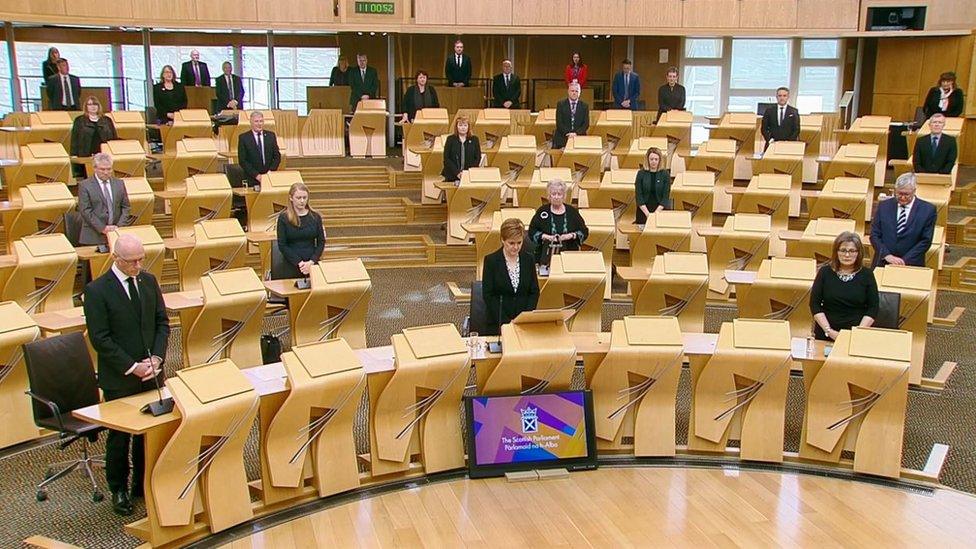
- Published9 April 2021
